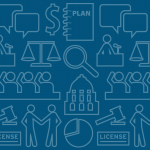The ABC’s of Administrative Law in Public Health Practice
Learn how admin law guides public health agencies
Administrative law governs how public health agencies implement and enforce their policies and programs at all levels of government.
Specifically, administrative law guides regulation of food safety, water quality, housing conditions, pharmaceuticals and chemicals, occupational safety and health, and medical practice, among other areas. It governs implementation and enforcement of public health policies and programs from retail licensing and lead paint inspections to quarantine orders and eligibility and disbursement decisions for public benefits like Medicaid and the Special Supplemental Nutrition Program for Women, Infants, and Children (WIC).
Administrative law allows federal, state, tribal, local, and territorial health agencies to exercise extensive powers over individuals and private entities. Due to the reach of these powers and the possibility of infringement on the rights of individuals, it’s crucial for public health practitioners to have a thorough understanding of administrative law.
That’s why ChangeLab Solutions partnered with the Centers for Disease Control and Prevention's (CDC) Public Health Law Program and the National Association of County and City Health Officials (NACCHO) to deliver this webinar on administrative law. Preview the training content by watching this video short.
Overview
- Learn the foundational principles of administrative law.
- Understand the scope of administrative law and why it is important for public health.
- Recognize how critical legal principles influence the broad range of public health powers and set appropriate limits on those powers in order to protect individual rights.
Although this was intended to be a 2-part series, the second webinar was canceled due to the COVID-19 pandemic.
